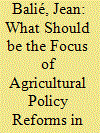|
|
|
Sort Order |
|
|
|
Items / Page
|
|
|
|
|
|
|
| Srl | Item |
| 1 |
ID:
179738


|
|
|
|
|
| Summary/Abstract |
Public fast charging infrastructure (FCI) is essential for the adoption of electric vehicles (EVs). To reach higher EV penetration, investments into the development of a comprehensive and widespread fast charging network are necessary. However, current investments in FCI are only profitable in specific locations resulting in a severe lack of deployments in most areas. The wish for rapid development of both, EVs and related charging opportunities, requires political support measures for FCI. This paper investigates various support measures regarding their contribution to a comprehensive expansion of FCI through profitability enhancement. We illustrate the impact of different support measures on the profitability of three different charging power categories at three different located charging sides along the German freeway. Besides the traffic volume, the profitability of FCI strongly depends on the location's surrounding charging facilities and population characteristics and decreases with increasing charging power. Currently available support measures such as investment subsidies or the exemption from the electricity tax do not contribute significantly to a widespread expansion of FCI. Changes in the demand charges have a higher potential to support nationwide investments in FCI.
|
|
|
|
|
|
|
|
|
|
|
|
|
|
|
|
| 2 |
ID:
175027


|
|
|
|
|
| Summary/Abstract |
Americans strongly support policies aimed at increasing the use of renewable energy. Prior research has found that, overall, support for renewable energy tends to be motivated primarily by people's perceptions that it creates economic benefits and reduces environmental harms. However, the extant research has not established how these motivations vary across political segments. Here we investigate (a) if and how Republicans and Democrats differ in their stated motivations for supporting a transition to renewable energy, and (b) what demographic and attitudinal variables best predict Republicans' and Democrats' support for renewable energy policies. Using a nationally representative sample of American registered voters, we found a consistent pattern across multiple methods of analysis: Republicans' (compared to Democrats') support for renewable energy is driven more by considerations of economic costs/benefits, whereas Democrats' (compared to Republicans') support is driven more by concern about global warming. These partisan differences hold significant implications for those who seek to effectively tailor policy and strategic communication to these political segments.
|
|
|
|
|
|
|
|
|
|
|
|
|
|
|
|
| 3 |
ID:
171417


|
|
|
|
|
| Summary/Abstract |
Climate protection goals can only be achieved if the expansion of renewable energies is publicly supported. This paper analyzes the relevance of the perceived importance of policy goals and framework conditions as well as individual risk, time, and social preferences for the support of the German energy transition. Based on data from an online survey, our empirical analysis reveals that the perceived importance of climate protection, nuclear risks, changes in the landscape and economic effects are decisive for a strong support of the energy transition. In addition, it reveals that the importance of the policy goals is driven by political orientation but also by trust and a feeling of responsibility. Therefore, this study emphasizes the need to compensate for the negative consequences of the transition process, to take confidence-building measures, and to sensitize the public for their own stake in greenhouse gas emissions.
|
|
|
|
|
|
|
|
|
|
|
|
|
|
|
|
| 4 |
ID:
170360


|
|
|
|
|
| Summary/Abstract |
While a lot of research has been conducted on agricultural subsidies and other forms of policy transfers in developed and developing countries alike, substantial data constraints have characterised those conducted in developing countries. For this study, we employ a novel and uniquely developed dataset on these policies in Sub-Saharan Africa (SSA), to analyse the impact of policy reforms, using the latest available GTAP 9.1 Data Base, in the widely employed GTAP framework, for the first time. We simulate the scenarios of removal of output subsidies, removal of ‘market development gaps’ within and outside the country. Our results indicate that removing market development gaps is likely to increase the agricultural output without affecting trade much, while removing the subsidies could harm output a lot by import-substitution of the costly domestic output. We conclude that governments in SSA may do well to focus on developing their markets better rather than cutting the assistance to their farmers, which could in fact be counter-productive instead of raising the efficiency of domestic farmers through competition.
|
|
|
|
|
|
|
|
|
|
|
|
|
|
|
|
|
|
|
|
|